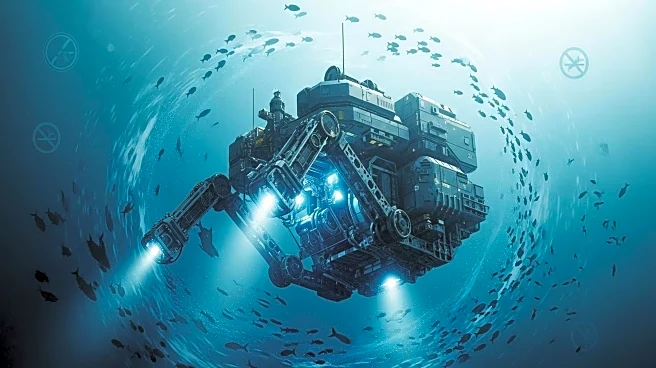What is the story about?
What's Happening?
The Metals Company (TMC) has made significant strides in its deep-sea mining endeavors, receiving formal notice from the National Oceanic and Atmospheric Administration (NOAA) that its applications are in full compliance with the U.S. Deep-Seabed Hard Mineral Resources Act. This compliance grants TMC priority rights for exploration in two target areas, moving the applications into a final 100-day certification phase. TMC's stock has surged over 400% year-to-date, driven by investor excitement over deep-sea minerals and electric vehicle (EV) demand. Despite being pre-revenue, TMC reported a Q2 2025 net loss of $74.3 million, with cash reserves of $115.8 million expected to last into 2027. The company aims to start commercial deep-sea mining by Q4 2027, contingent on securing necessary permits.
Why It's Important?
TMC's progress is pivotal in the context of the growing demand for critical minerals used in EV batteries and renewable energy technologies. The company's ability to secure U.S. regulatory compliance provides a potential pathway to production, reducing reliance on international bodies like the International Seabed Authority (ISA), which has delayed global mining rules. However, TMC faces significant environmental opposition, with many countries and NGOs advocating for a moratorium on deep-sea mining due to potential irreversible biodiversity loss. The company's success could set a precedent for the nascent deep-sea mining industry, impacting global supply chains and geopolitical dynamics, particularly in reducing dependency on China for rare earths and battery metals.
What's Next?
TMC is navigating a dual-track permitting approach, pursuing both international and U.S. routes. The final certification from NOAA is expected by Q4 2025, potentially allowing TMC to apply for a U.S. commercial recovery permit. The company must also complete its Environmental Impact Assessment (EIA) to demonstrate that commercial operations will not cause unacceptable harm. Securing offtake agreements with battery manufacturers or automakers could validate TMC's business model and provide financial stability. The outcome of these regulatory and commercial efforts will be crucial in determining TMC's ability to commence production by 2027.
Beyond the Headlines
The ethical and environmental implications of deep-sea mining are profound. While TMC promotes its operations as a lower-impact alternative to traditional mining, the potential for significant ecological disruption remains a concern. The company's narrative of providing 'metals with a lower footprint' is central to its strategy, aiming to appeal to stakeholders seeking sustainable supply chains. However, the long-term environmental impacts of deep-sea mining are still largely unknown, and TMC's ability to address these concerns will be critical in gaining broader acceptance and support.















